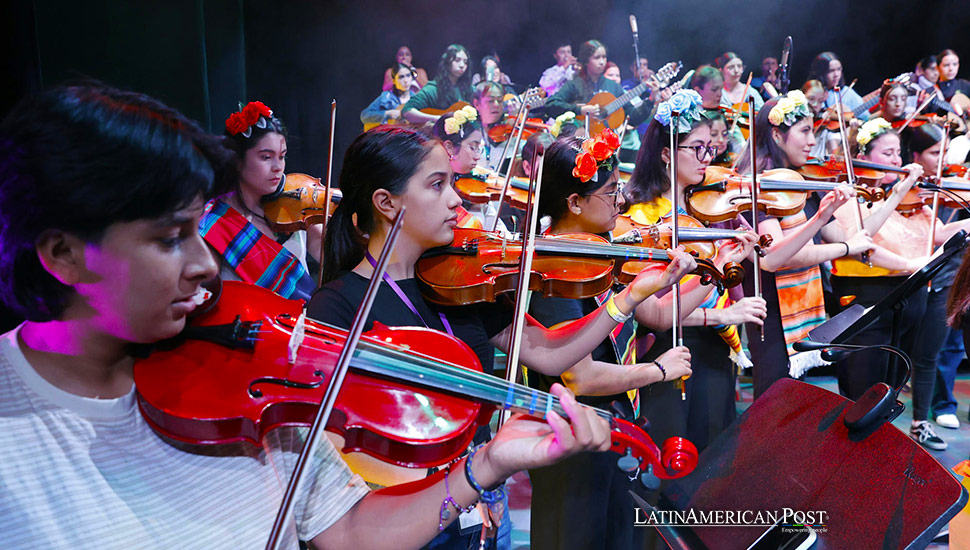Young Women Break Barriers in Traditional Mexican Mariachi Music

As the Mariachi Vargas de Tecalitlán experiences a musical renaissance, a new generation of young Mexican women are making their mark in the industry with their voices, trumpets, violins, vihuelas, and guitarrones, championing the legacies of Chavela Vargas and Lola Beltrán.
In an era where traditional mariachi music is dominated by renowned bands like the Mariachi Vargas de Tecalitlán, a fresh wave of young Mexican women are carving out a space for themselves in this male-dominated genre. These trailblazing women are bringing their unique talents to the forefront, inspired by the legendary Chavela Vargas and Lola Beltrán. Mariana Pimienta, a violinist with the Mariachi Femenil de Tecolotlán ‘Ana Bertha Lepe,’ shared her insights during a visit to Bogotá, explaining how mariachi has historically been a male preserve.
Mariachi music, a symbol of Mexican culture, has long been dominated by male performers. However, the Mariachi Femenil de Tecolotlán ‘Ana Bertha Lepe’ is changing the narrative. This pioneering school, dedicated exclusively to mariachi music education, empowers girls and young women by providing a platform to develop their musical skills and embrace their cultural heritage. “The woman has the main voice in the songs,” Pimienta emphasized, highlighting the pivotal role of women in this transformation.
Recently, 43 young women from this school traveled to Bogotá to perform in a concert with the Orquesta Batuta Laboratorio and the Orquesta Filarmónica de Mujeres members. The event, ‘Mujeres en armonía: Mariachi Colombia-México,’ saw 85 young musicians unite, blending their voices and instruments to claim their rightful place in Mexican music. The youngest participant was just 14 years old, yet many of these girls were already seasoned performers, having traveled across Latin America to share their country’s culture.
A Generation’s Pride
For Mariana Pimienta, mariachi music has been a lifelong companion. “Music has always been present in my life, and the joyful yet emotional sounds of mariachi helped me express my emotions,” she explained. Holding her violin at the Centro Nacional de las Artes Delia Zapata Olivella, she shared how playing the instrument provides a moment of peace and clarity. As one of the oldest students in the school, she represents the first generation of women to graduate as mariachis, a role that fills her with pride. “The younger girls see me as a role model. It feels wonderful,” she said.
Backstage, the musicians and singers exchanged stories and laughter, reflecting on their ten-day preparation in Colombia. They were conscious of being role models, a sentiment their director, Nathaly López, echoed. She reminded them during rehearsals that they carried the pride of someone in the audience. López, a Colombian who deeply respects Mexican culture, works tirelessly to honor and promote it through these young performers—the past week had been a continuous celebration of the fusion of their two cultures.
The Rise of Women in Mariachi
Historically, mariachi groups in Mexico have been male-dominated. In Colombia, while there are some all-female groups, they remain a rarity. “It’s important to have women challenging this cultural norm and saying, ‘We can do it too,'” López stated. Mariachi was declared an Intangible Cultural Heritage of Humanity by UNESCO in 2011, and it remains trendy in Colombia, often featured in social events such as weddings, religious celebrations, and birthdays.
The cultural exchange between Mexico and Colombia is evident near the Delia Zapata Olivella Center, where the concert occurred. The neighboring Gabriel García Márquez Cultural Center frequently hosts performances of Mexican regional music, including the renowned Mariachi Vargas de Tecalitlán. Pimienta recounted how audiences in various locations have encouraged them to take pride in being part of a traditionally male-dominated genre. “People have been supportive, telling us it’s great that women are now part of something that used to be so male-dominated,” she said.
Despite the progress, Pimienta noted that many mariachi groups are becoming more inclusive, with women often taking on leading roles as vocalists. This shift gradually balances the gender dynamics in mariachi music, with men now more commonly seen playing instruments while women sing.
Looking Ahead
These young women’s journey in mariachi music is a testament to their resilience and passion for their cultural heritage. Their presence on international stages showcases their talent and challenges long-standing gender norms in the music industry. As they continue to break barriers, they inspire future generations of female musicians to pursue their dreams without fear of societal constraints.
The Mariachi Femenil de Tecolotlán ‘Ana Bertha Lepe’ has set a precedent for musical education and empowerment, fostering a new era of mariachi music that celebrates tradition and innovation. Through their performances, these young women are preserving a vital part of Mexican culture and redefining it for the modern age.
Their story is a powerful reminder that cultural traditions can evolve and adapt, becoming more inclusive and representative of a society’s diverse voices. As these young mariachis continue to make their mark, they pave the way for a brighter, more equitable future in music.
The emergence of young women in the mariachi music scene marks a significant cultural shift, demonstrating the power of music as a tool for social change. By embracing their heritage and challenging gender norms, these talented musicians are reshaping the landscape of mariachi music. Their journey is one of pride, resilience, and cultural celebration, reflecting Latin American traditions’ dynamic and evolving nature.
As the Mariachi Femenil de Tecolotlán ‘Ana Bertha Lepe’ continues to inspire and innovate, it stands as a beacon of hope and progress, showing that any barrier can be overcome with dedication and passion. These young women are not just musicians but cultural ambassadors, carrying the rich legacy of mariachi music into the future.





